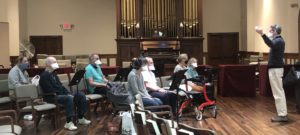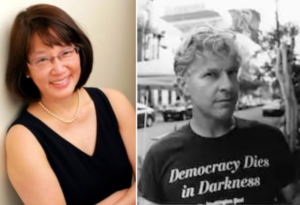What else are doctors, nurses, and therapists relying on to help patients heal mentally and physically? A fabulous dose of music therapy.
Music therapy is based on evidence from numerous research studies and is now used at so many leading hospitals and recommended by highly-regarded medical professionals. From one to 100, patients of all ages benefit from music used in partnership with good medicine.
Take Willow, a one-year-old cancer patient at Phoenix Children’s Hospital. Music therapy for her goes well beyond distracting her from discomfort. “The music is tapping into the part of her brain – the “control tower” that tells the rest of her body what to do. In this case, slow down her heart rate, reduce toxins that cause stress, and begin the process of healing. And also, promote her continued development, despite spending so many hours confined to the hospital room.” (Diane Meehl for Phoenix Children’s Hospital)
Now more than ever, live music can be heard throughout different departments in a hospital, including surprising places like a neonatal intensive care unit to soothe those vulnerable newborns. It’s well-known that music and music therapy calms and relaxes patients. So much so that the Mass General Environmental Music Program recruits highly-talented musicians to perform live music in the hospital’s public spaces to help their patients, families, as well as their staff. MGH tries to create restful and pleasant spaces by distracting people with music to lighten their moods. The standard sterile hospital spaces are transformed with music helping to relax patients and other visitors. Musicians can be heard playing in outpatient cancer care floors, inpatient pediatric areas, and the main lobby.
According to the American Music Therapy Association, creating, singing, moving to, and listening to music helps  strengthen and widen a patient’s capabilities. We’ve always endorsed the benefits of music for everyone—cognitive, emotional, social, and physical benefits, and leading experts in the field agree with us. The Cleveland Clinic provides a list of music therapy benefits that include lowering blood pressure, improving memory, reducing muscle tension, managing pain, and increasing happiness.
strengthen and widen a patient’s capabilities. We’ve always endorsed the benefits of music for everyone—cognitive, emotional, social, and physical benefits, and leading experts in the field agree with us. The Cleveland Clinic provides a list of music therapy benefits that include lowering blood pressure, improving memory, reducing muscle tension, managing pain, and increasing happiness.
Music therapy is often enlisted to help with specific health issues such as Alzheimer’s or Parkinson’s Disease, stroke, brain injury, and a host of other ailments. The evidence shows that music therapy works. The Executive Editor of Harvard Women’s Health Watch, Beverly Merz, goes even further and says that music therapy is not just a nice perk. It can improve medical outcomes and quality of life by reducing anxiety during medical procedures, helping restore lost speech, reducing side effects of cancer therapies, and giving some relief from pain.

As CCM voice instructor and leader of the Singing with Parkinson’s Chorus, Jay Lane says, “Music has so many therapeutic benefits! Singing with others gives you endorphins; playing an instrument builds connections between the left and right brain; dancing improves your balance—the list seems to grow all the time as we discover more and more. The important thing is not to get hung up on perfection—just get out there and make music!”
Since ancient times music has been used as a soothing and therapeutic tool. In 1945, music therapy was used to help returning soldiers from the war overcome trauma. Music continues to be used today to help soldiers reduce their anxieties and to cope with depression.
Even though we know music has special powers, it’s certainly not the only medication or treatment patients need to heal. But it sure is the ideal collaborative partner for medicinal treatments and surgical procedures.
Discover more about the fascinating intersection between music and medicine by attending CCM’s Music & Medicine Concert and Talk on Friday, November 12 at 7:30 pm.
 The evening will feature a conversation with Dr. Lisa Wong of Harvard Medical School and Geoff Edgers of The Washington Post. They will discuss numerous topics, including what happens in your brain when you play music, which great composers were also connected to the medical field, and how music has become more deeply used as a therapy to treat patients.
The evening will feature a conversation with Dr. Lisa Wong of Harvard Medical School and Geoff Edgers of The Washington Post. They will discuss numerous topics, including what happens in your brain when you play music, which great composers were also connected to the medical field, and how music has become more deeply used as a therapy to treat patients.
Plus, you’ll experience a chamber music performance by CCM faculty members Yelena Beriyeva on piano, Egle Jarkova on violin, and Stephen Marotto on cello.
Purchase your tickets today, and we’ll see you there!
Back To Top